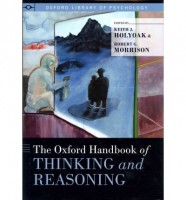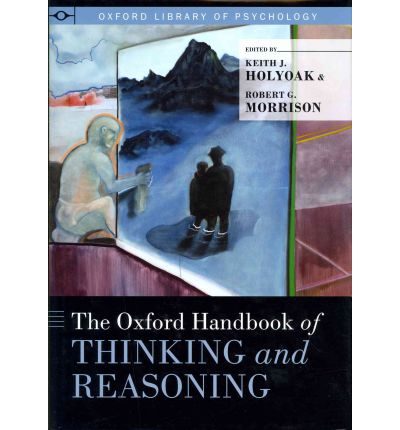 Editors: Keith J. Holyoak and Robert G. Morrison
Editors: Keith J. Holyoak and Robert G. Morrison
Publisher: Oxford University Press – 836 pages
Book Review by: Nano Khilnani
For all those who want to learn how the mind works, this is a must-read book.
Thinking and reasoning were, until about a century ago, subjects studied under the umbrella of philosophy. But since then they have became very important areas of scientific investigation under the modern fields of cognitive psychology, particularly neuroscience.
Science requires data to test theories and to establish results as facts. It is refreshing to know that whereas in the past, thinking and reasoning were in the province of philosophy, today they are part of science and very exciting and revealing, ongoing research studies.
Besides pointing out the transition of the field of thinking and reasoning from philosophy to science, the editors of this book also give readers of this book a sense of the direction in which actual research is heading on this field.
Some of the chapters in this book deal with:
- Introductions to foundational issues in thinking and reasoning
- Methods of study in the field of thinking an reasoning
- Treatment of specific types of thinking and reasoning
- Application of these types of thinking and reasoning to business, education, law, medicine, music and science
To whom would this volume be of interest? Scholars and students working in artificial intelligence; clinical, developmental and social psychology; economics; education; gerontology; human development; humanities; law; linguistics; philosophy; and other fields.
This book is the collective work of 77 eminent researchers specializing in various areas in the study of thinking and reasoning. Located in Australia, Canada, Germany, the United Kingdom, and mostly, in the United States, they have contributed articles for the 40 chapters in this volume, which is organized into seven distinct parts, namely:
- General Approaches to Thinking and Reasoning
- Deductive, Inductive, and Abductive Thinking
- Judgment and Decision Making
- Problem Solving, Intelligence and Creative Thinking
- Ontogeny, Phylogeny, Language, and Culture
- Modes of thinking
- Thinking in Practice
Chapter organization is excellent and very conducive to learning and absorption of material. Like some other handbooks of Oxford University Press, a boxed area just below the chapter title contains an Abstract and Key Words to be learned from that chapter. What follows is an Introduction of the main material to be learned in that chapter, as well as related topics.
For example, in chapter 2 – Normative Systems: Logic, Probability, and Rational Choice, following the Introduction are discussions under each of the three topics. These are followed by Conclusions and Future Directions. The chapter ends with a long list of References for further study.
Charts and tables are provided as study aids as well as laying out of data gathered from research studies.
This is an excellent volume on the growing field of thinking and reasoning, now a part of high-level human cognition which includes creative thinking, decision making and problem solving. These have of late become increasingly important areas of inquiry and scientific research.
The better we understand ourselves and others, the happier are the lives we can lead. The editors and contributors therefore deserve to be applauded for this monumental work which contributes immensely to understanding ourselves and our thoughts.
Keith J. Holyoak, Ph.D., Distinguished Professor of Psychology at the University of California, Los Angeles, is a leading researcher in human thinking and reasoning. He received his B.A. from the University of British Columbia in 1971 and his Ph.D. from Stanford University in 1976. Dr. Holyoak was on the faculty of the University of Michigan from 1976 to 1986 and then joined the Department of Psychology at UCLA.
His work combines behavioral studies with both cognitive neuroscience and computational modeling. Dr. Holyoak has published over scientific 180 articles, and is the author or co-author or editor of numerous books, including Induction: Processes of Inference, Learning and Discovery (MIT Press, 1986), Mental Leaps: Analogy in Creative Thought (MIT Press, 1995), and the Cambridge Handbook of Thinking and Reasoning (Cambridge University Press, 2005).
Robert G. Morrison, PhD., Assistant Professor of Psychology and Neuroscience at Loyola University Chicago, uses behavioral, computational, and neuroimaging methods to investigate memory and reasoning throughout the lifespan. After receiving his B.S. from Wheaton College, Morrison worked both as a scientist and a conceptual artist.
He discovered cognitive science at the interface of these worlds and studied Cognitive Neuroscience at UCLA, where he received his Ph.D. In 2004, after co-founding Xunesis (www.xunesis.org) and completing a National Institute of Aging post-doctoral fellowship at Northwestern University, Morrison joined the Department of Psychology and the Neuroscience Institute at Loyola in 2009.
Dr. Morrison has published numerous scientific articles and chapters and has edited the Cambridge Handbook of Thinking and Reasoning (Cambridge University Press, 2005). Dr. Morrison’s research has been funded by the National Institute of Mental Health, the Office of Naval Research, the American Federal of Aging Research, and the Illinois Department of Public Health.






